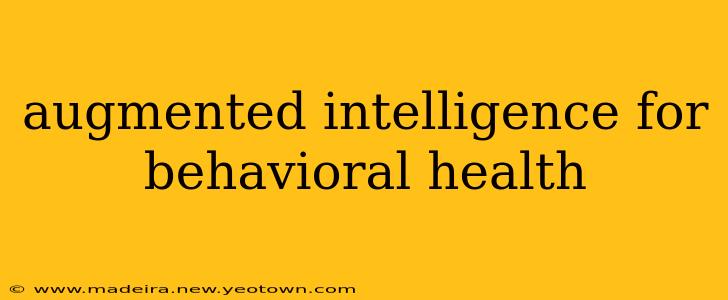The world of behavioral health is undergoing a quiet revolution, driven by the burgeoning field of augmented intelligence (AI). No longer a futuristic fantasy, AI is subtly, yet profoundly, transforming how we diagnose, treat, and support individuals struggling with mental health challenges. This isn't about robots replacing therapists; it's about empowering clinicians and enhancing the patient experience. This journey started with a simple question: how can technology bridge the gap in access to quality behavioral healthcare? The answer, as we're discovering, lies in the power of augmented intelligence.
What is Augmented Intelligence in Behavioral Health?
Augmented intelligence, unlike artificial intelligence focused on complete automation, focuses on enhancing human capabilities. Imagine a therapist equipped with tools that analyze patient data, predict potential crises, and personalize treatment plans with unprecedented accuracy. That's the essence of augmented intelligence in behavioral health. It leverages AI's power to process vast amounts of data, identify patterns, and offer insights that human experts might miss, ultimately leading to better outcomes.
This isn't a replacement for the human element; instead, it’s a powerful ally, streamlining workflows and freeing up clinicians to focus on what matters most: building rapport and providing empathetic, personalized care.
How Can AI Enhance Behavioral Health Treatment?
The applications of augmented intelligence in behavioral health are vast and constantly evolving. Think of it as a supportive ecosystem, enhancing various aspects of care:
Early Detection and Prevention:
AI algorithms can analyze various data points – from social media activity to wearable sensor data – to identify individuals at risk of developing mental health conditions. Early intervention is key, and AI offers a proactive approach to prevention.
Personalized Treatment Plans:
One size doesn't fit all when it comes to mental health. AI can analyze patient data (medical history, symptoms, lifestyle) to create highly personalized treatment plans, improving the likelihood of successful outcomes.
Improved Diagnosis and Assessment:
AI-powered tools can assist in diagnosing mental health conditions by analyzing language patterns, facial expressions, and other subtle indicators during therapy sessions. This can help speed up the diagnostic process and improve accuracy.
Monitoring and Managing Symptoms:
Wearable sensors and apps can track patient symptoms in real-time, providing clinicians with valuable data to adjust treatment plans as needed. This continuous monitoring improves patient engagement and empowers them to actively participate in their recovery.
What are the Ethical Considerations of AI in Behavioral Health?
While the potential benefits are significant, ethical considerations are paramount. Data privacy and security must be prioritized. Algorithmic bias needs to be addressed to ensure equitable access to care. Maintaining the human element and avoiding dehumanizing aspects of care are crucial. Transparency in how AI tools are used and their limitations is also essential to build trust with both patients and clinicians.
How Does AI Improve Access to Behavioral Healthcare?
One of the most pressing challenges in behavioral health is access to care. Many individuals, particularly in underserved communities, lack access to qualified professionals. AI-powered tools can help bridge this gap by providing remote access to care, automated support, and scalable solutions that can reach a broader population.
What are the Challenges in Implementing AI in Behavioral Health?
Despite the potential, there are significant challenges to overcome. These include:
- Data Privacy and Security: Protecting sensitive patient data is critical.
- Algorithmic Bias: Ensuring fairness and avoiding discrimination in AI algorithms is paramount.
- Integration with Existing Systems: Seamless integration with existing electronic health records and other systems is crucial.
- Lack of Expertise: A shortage of professionals skilled in AI and its application to behavioral health presents a hurdle.
- Cost and Accessibility: The cost of developing and implementing AI solutions can be prohibitive, limiting access for some.
The Future of Augmented Intelligence in Behavioral Health
The future of behavioral health is intertwined with the responsible and ethical application of augmented intelligence. As AI technology continues to evolve, we can expect even more innovative solutions to emerge, transforming how we approach mental health care. The journey is just beginning, and the potential to improve lives is immense. The focus should remain on using AI to empower both clinicians and patients, creating a collaborative and supportive environment for healing and recovery. The goal isn’t to replace human connection, but to amplify its power.

